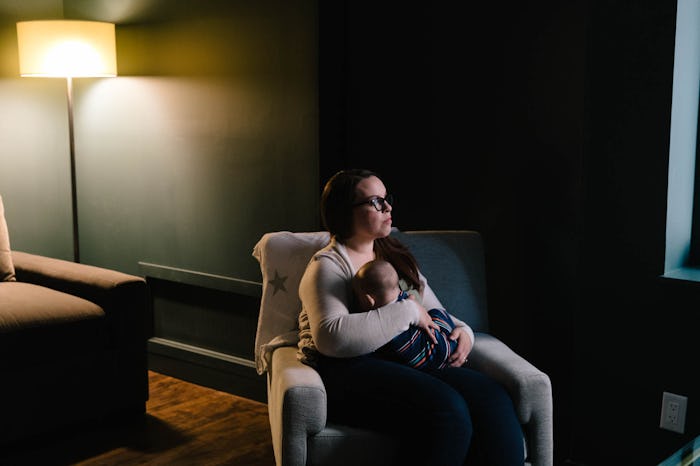Life
If You're Feeling Sad While Breastfeeding, Here's What Might Be Happening
Most mothers imagine feeling unbridled joy when nursing their baby — like a mother gently smiling down at her little one in a Medela ad. When it comes to breastfeeding in real life, however, maternal happiness is never the whole story. Because really, what's more emotionally fraught than nursing a baby with your body? Especially in the beginning, and when the going gets tough, anxiety, sadness, and agitation are common. If you feel sad while breastfeeding, here's what it means and what you can do to feel better soon.
"Breastfeeding is an emotional rollercoaster for many women," explains Kristin Gourley, International Board Certified Lactation Consultant (IBCLC) of Lactation Link, in an email to Romper. For one thing, postpartum hormonal changes can throw anyone off their stride. Add to that the social, psychological, and physiological challenges of breastfeeding — as in, oh my gosh, why won't my baby just latch? Or, I haven't slept in a month — and it's no wonder nursing isn't as simple as advertised. "Both moms and babies find deep comfort in breastfeeding," notes Gourley. But when it's not going well, the pain and sadness can be acute.
For a small percentage of women, however, the cause of sadness when nursing is entirely biological. According to Kelly Mom, a condition called dysphoric milk ejection reflex (D-MER) results in instant, intense feelings of sadness every time your milk lets down. You might feel agitated, a hollow feeling in the pit of your stomach, or even hopelessness and dread. It's a dark space to be in every time you nurse your baby. If this is you, the best thing to do is contact an IBCLC or your doctor for advice. As the Australian Breastfeeding Association reported, mild to moderate cases of D-MER can be treated with lifestyle changes. Dehydration, stress, and caffeine may also play a role. The good news is that symptoms generally ease as time goes on.
Whatever the cause of your sadness while nursing, it's important to remember that it doesn't make you a bad parent. The truth is, breastfeeding is really hard. And when women struggle, there's not always a ton of support or education readily available. Despite this, society still heavily promotes breastfeeding as the best way to feed your baby, and even shames moms who have a hard time. As Gourley explains, that's a recipe for attaching negative emotions to an essentially loving act. "When you combine all these evolutionary, hormonal, protective, nutritional, and societal factors, it's no wonder that breastfeeding is an emotional rollercoaster — there's so much that plays into it and it doesn't always come easily," Gourley says.
Bottom line: if you're plunging into a vortex of painful emotions every time you breastfeed your baby, it's time to reach out for help. After all, every woman deserves a warm, comforting breastfeeding relationship if she wants one. An IBCLC can help you sort through your feelings to address the root cause, while helping breastfeeding to go more smoothly.
"Postpartum time is not always sunshine and roses," says Gourley. "It's the sign of a strong parent who can reach out for help with whatever difficulties they are facing."
As an IBCLC, one of Gourley's favorite parts of the job is helping women see everything they're already doing right, even when nursing is difficult or a source of sadness. "Women do so many great things that they don't give themselves credit for. Even if a mom wanted to breastfeed exclusively, for example, but needed to supplement for any number of reasons, it doesn't mean that she failed or that she should judge herself at all," she says. Visit the International Lactation Consultant Association website to find an IBCLC near you, or Lactation Link, for online breastfeeding classes and more.
Check out Romper's new video series, Bearing The Motherload, where disagreeing parents from different sides of an issue sit down with a mediator and talk about how to support (and not judge) each other’s parenting perspectives. New episodes air Mondays on Facebook.
